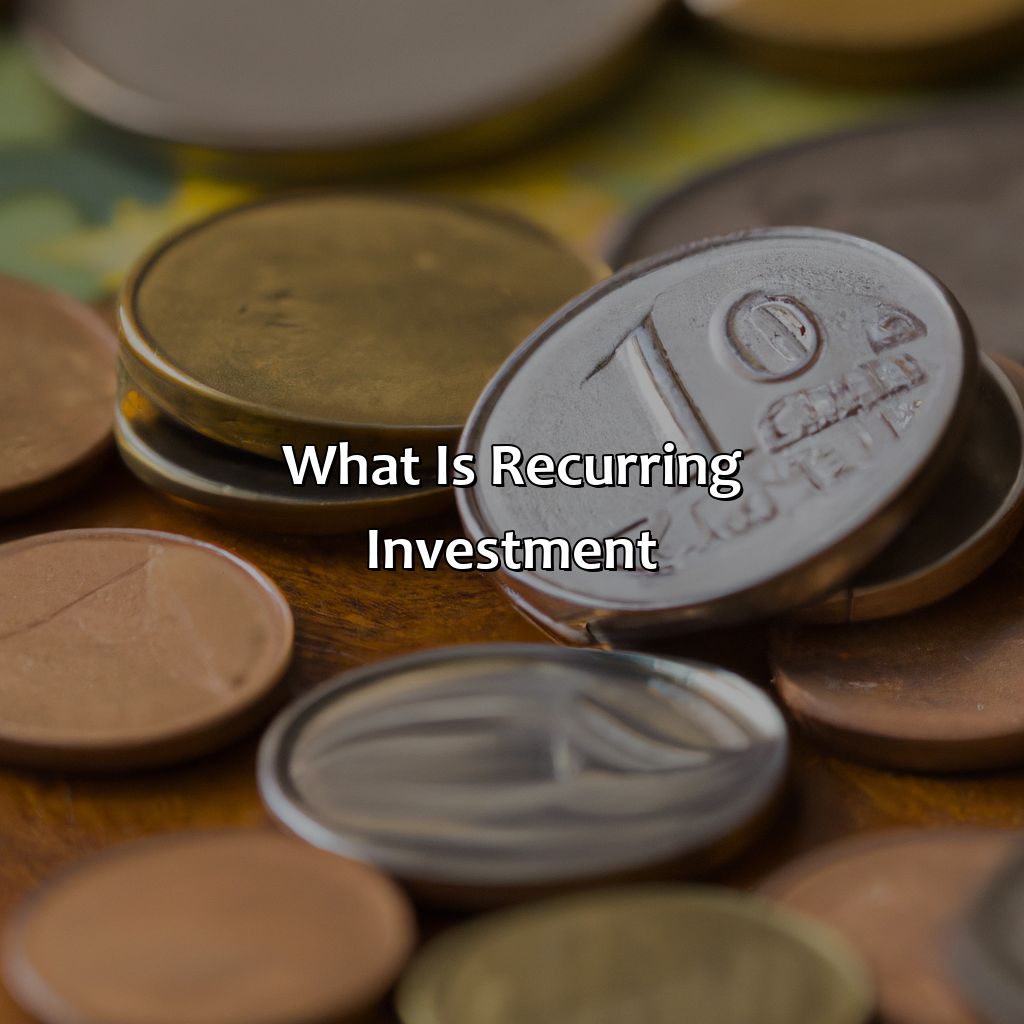What Is Recurring Investment?
Key Takeaway:
- Recurring investment is a strategy of investing small amounts of money at regular intervals, which allows individuals to save and invest their money without straining their finances.
- Recurring investment provides a disciplined approach to investing, helping individuals achieve their financial goals in a cost-effective manner. It also offers the convenience of automation, as investors can set up the recurring investment and let it run without any further action.
- There are several types of recurring investments, including systematic investment plans (SIPs), recurring deposits (RDs), and gold savings schemes. It is important to consider factors such as risk appetite, investment horizons, and return expectations before choosing a recurring investment.
Are you looking for an effective way to grow your savings? Recurring investments allow you to do just that, without having to worry about timing the markets. Read on to learn more about how recurring investments can benefit you.
What is Recurring Investment?
Investing a fixed amount of money at regular intervals is called recurring investment. Such investments not only inculcate financial discipline but also help in wealth creation in the long run. Recurring investments can be made in various financial instruments, such as mutual funds, stocks, and bonds, among others. They allow individuals to invest small amounts periodically, thereby reducing the burden of a significant amount of investment in one go.
Recurring investments have become popular due to their flexibility and convenience. Investors can choose the frequency and amount of investment, which can be changed or canceled anytime. Moreover, they offer the benefit of rupee cost averaging, wherein, more units of the investment are purchased when the price is low and fewer units when the price is high. Recurring investments are useful in achieving various financial goals, such as building an emergency corpus, saving for a vacation, or planning for children’s education.
It is essential to choose the right financial instrument for recurring investment based on one’s risk appetite, financial goals, and investment horizon. Investors must also consider the charges associated with the instrument, such as management fees in mutual funds, transaction charges in stocks, and redemption charges in bonds. Consistent investment in a diversified portfolio of quality instruments can generate significant returns in the long run.
In the early 2000s, recurring investment started gaining popularity in India due to the growing middle class and easy availability of internet-enabled services. Today, many financial service providers offer the option of recurring investment, making it accessible to a broader section of society. With the increasing awareness of the benefits of recurring investment, it has become an integral part of financial planning for many individuals.
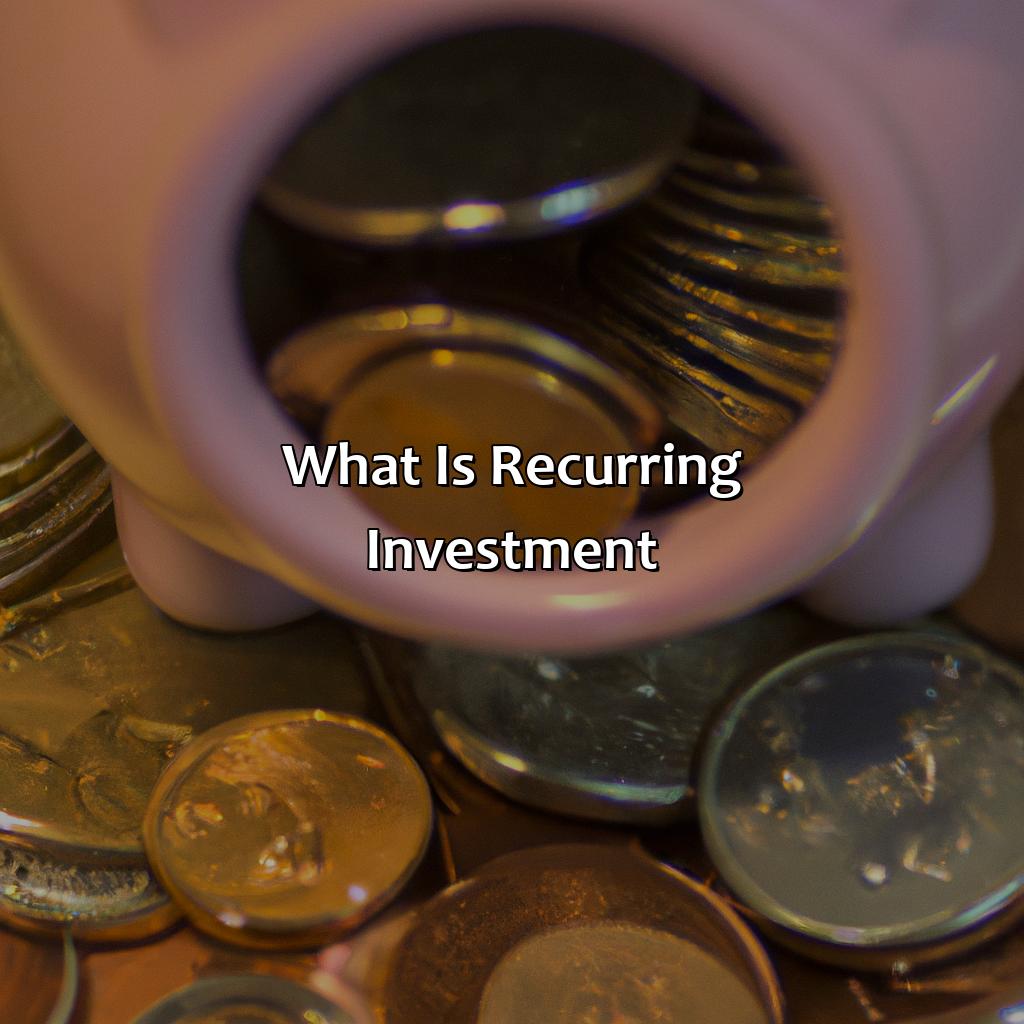
Image credits: retiregenz.com by Harry Arnold
Definition of Recurring Investment
Recurring investment, a systematic approach to investments, involves regular intervals of predetermined amounts of money being invested into securities like mutual funds or stocks. This method is known for reducing the impact of market volatility on an investor’s portfolio. Along with being a simple and effective way to invest, recurring investments also encourage discipline and long-term goal setting. The consistency of recurring investments further ensures the compounding of returns, increasing the potential for greater returns in the long run.
In addition to being a useful technique for long-term stability, recurring investment options offer investors the flexibility to modify their investments according to their evolving financial goals. By investing a small sum over a long duration, individuals can build a significant corpus of funds, ideal for achieving milestones like retirement. In cases where an individual may not have the necessary capital to invest a larger amount at once, recurring investments offer an excellent opportunity for investment.
For instance, consider the case of Emily, who invested small amounts of money in a mutual fund through a recurring investment plan for over 20 years. By the end of the tenure, Emily not only accumulated a significant sum, but the compounding effect ensured a sizeable profit. Thus, by embracing a regular investment practice like recurring investment, investors can ensure that they move closer to achieving their financial goals.
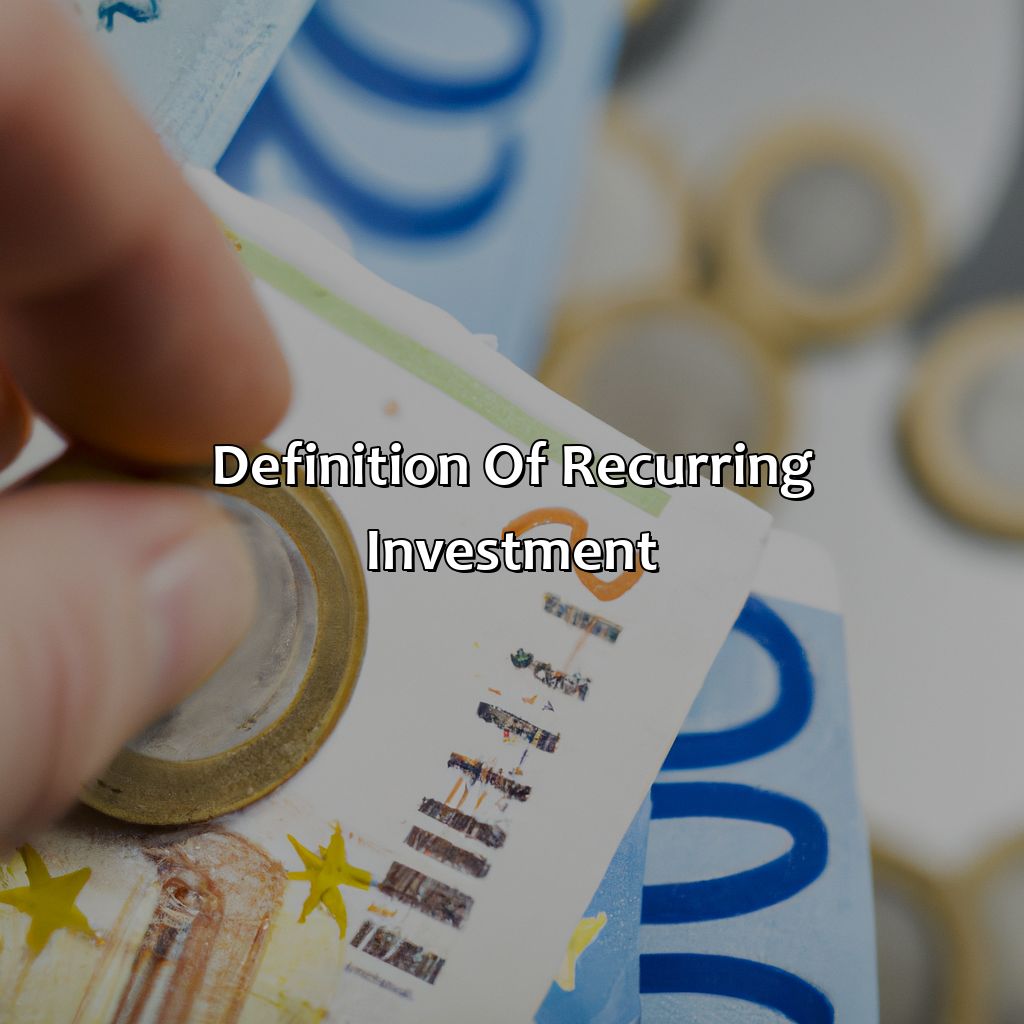
Image credits: retiregenz.com by Joel Jones
Benefits of Recurring Investment
Let’s inspect the subsections of this section more carefully. This will help you grasp the one-of-a-kind advantages of allocating a certain amount of money for investing periodically. Doing this allows you to enjoy the advantages of recurring investments in your financial planning:
- Convenience
- Disciplined approach
- and cost-effective solutions.

Image credits: retiregenz.com by Yuval Jones
Convenience
The ease of recurring investments is undeniable and contributes to their growing popularity. By scheduling automatic withdrawals or purchases, investors can save time and reduce the stress of monitoring their portfolio. The regularity of these deposits also helps establish a disciplined approach to saving and investing for long-term goals. It’s an effortless way to stay on track with financial aspirations while minimizing errors or impulsive decisions.
In addition, recurring investments offer the flexibility to adjust the amount, frequency, and investment vehicle over time. This allows investors to adapt to changing market conditions, personal circumstances or goals without disrupting their overall savings strategy. Furthermore, by automating the process, investors can avoid the temptation to time the market or chase short-term gains that often result in missed opportunities.
A considerable benefit of recurring investments is the potential for compounding returns over time. Consistent contributions can add up and earn interest that grows exponentially over periods of decades or more. It’s a powerful tool for building wealth incrementally and reducing reliance on other income sources like Social Security in retirement.
Don’t miss out on the benefits of recurring investments. Take advantage of this simple yet effective technique to secure your future financial stability and growth. Start building your nest egg today with automated savings strategies that are hassle-free and proven to yield results over time.
Investing requires discipline, just like my weekly gym routine – except this time, the gains are financial instead of physical.
Disciplined Approach to Investing
Investing with a consistent, rule-based and systematic approach forms the basis for achieving long-term financial goals. Continuously investing small amounts at regular intervals over a period is known as ‘strategic investment planning’. It creates a disciplined environment for the investor to remain committed to their goal of building wealth. This approach helps eliminate panic selling in times of market downturns and urges individuals to stay invested during these times.
A disciplined investment approach involves regularly investing irrespective of volatility in markets or one’s personal circumstances. This way, investors can benefit from rupee cost averaging by purchasing a set amount at different prices. Moreover, it mitigates the risk of timing the market, which otherwise has proven to be futile over long periods. Continuous investment not only increases one’s savings but also inculcates financial discipline.
Additionally, consistent investments have compounded benefits such as predictable returns that are proportional to the invested amounts. Starting early with a modest sum opens up opportunities for reaping better returns and reaching even higher potential earnings compared to lump sum investments made later in life.
Samantha was initially sceptical about recurring investments due to her previous lackluster returns on her saving account balance. However, after diving deeper into strategic investing, she is now an advocate of disciplined investing habits and has seen exceptional growth within just two years of consistent inflows despite market volatilities.
If saving money was an Olympic sport, recurring investment would be the gold medalist.
Cost-effective
Investing regularly has a cost-efficient impact on one’s financial portfolio. The potential returns on investment increases along with the frequency of investments, and the average cost per unit falls, decreasing the overall expenditure of an investor over a prolonged period.
Regular investing facilitates steady compound growth as investors have more opportunities to capitalize on market ups and downs. This approach demands less capital invested in a single transaction and provides access to diversified securities without imposing significant financial risk. Besides, recurring investments help one in budgeting expenses better as money is regularly set aside for investment purposes.
Furthermore, when combining regular investments with an automated investment scheme, investors can dodge potential emotional-based errors that hinder gains in volatile markets. Sticking to this operation plan enables one to capitalize on dividend payments as well.
To make the most of recurring investments, spreading out funds between multiple high-performing stocks or bonds recommended. Starting small and gradually increasing investment amounts with time through incremental-amounts investments increases average cost-adjustments favorably over a more extended period for enhanced gains.
Ready to spice up your investment game? Here are the types of recurring investments that’ll make your bank account sing:
Types of Recurring Investments
For understanding various methods to invest your funds repeatedly, observe the ‘types of recurring investments’ section. Focus on SIP, RD, and Gold Savings Scheme. Each subsection offers an exclusive answer to assist you to accomplish your financial objectives methodically.
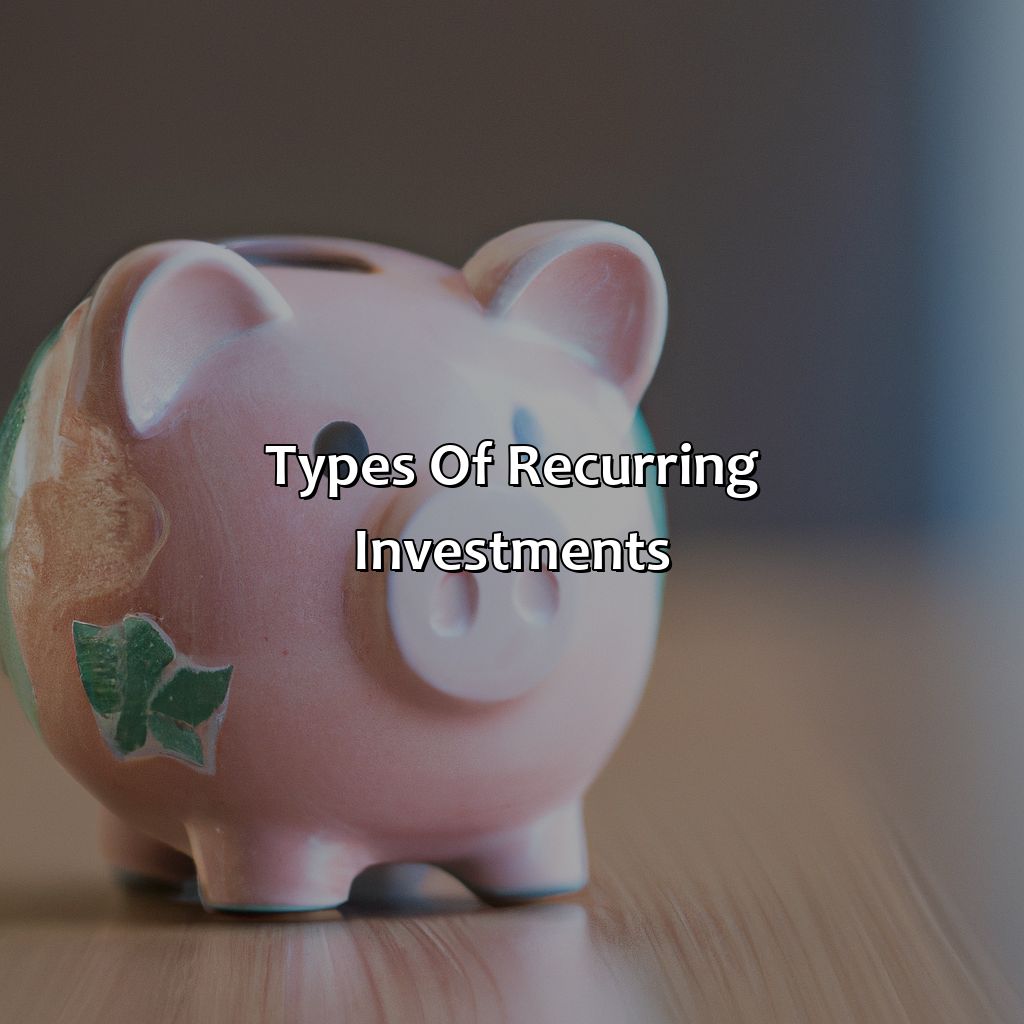
Image credits: retiregenz.com by Joel Duncun
Systematic Investment Plan (SIP)
When it comes to investing, a recurring investment is an excellent way to grow your wealth. One popular option is known as a periodic payment plan (PPP). PPPs work by allowing you to invest a fixed amount of money at regular intervals over a specified period. This investment plan can be customized based on your financial goals, risk appetite and time horizon.
A variation of the PPP is the systematic investment plan (SIP), which further simplifies your investment process by automating it. With an SIP, you choose a mutual fund scheme that meets your financial goals and invest a fixed amount of money into it at regular intervals. This enables you to benefit from rupee cost averaging, which reduces the impact of market volatility on your investments.
SIPs offer several advantages over other investment plans:
- they are convenient and accessible, as investors can start with an amount as small as INR 1000 per month.
- they provide flexibility in terms of choosing the frequency of investments such as weekly, monthly or quarterly.
- SIPs enable disciplined investing and ensure that investors stay invested for the long-term.
Intriguingly enough, not investing in SIPs may result in FOMO or fear of missing out on decent returns generated by abundant opportunities available in the volatile market. This makes them perfect for both first-time investors and experienced ones looking for an efficient method to diversify their portfolio and gain long-term profits.
Savings on repeat? RD’s got your back, Jack!
Recurring Deposit (RD)
A Recurring Deposit (RD) scheme is a type of investment where an individual deposits a fixed amount of money at regular intervals. The amount can be small and the duration for depositing can vary from a few months to several years. The interest rate offered usually depends on the tenure of the deposit.
The main advantage of this investment scheme is that it promotes regular savings habit in individuals, with no need for larger investments. One can start investing with as little as Rs 500 per month with no maximum limit. Another benefit is that investors are guaranteed returns on their deposits which makes it a popular choice among risk-averse investors.
These types of investments were first introduced in India by Post Office Savings Schemes in 1986, and have since gained immense popularity among Indians. Recurring Deposit schemes offered by banks and other financial institutions have higher interest rates than post offices, making them even more attractive avenues for investment.
One thing to keep in mind while opting for these schemes is that premature withdrawals could lead to penalty charges being levied. It’s important to carefully weigh the benefits against any potential penalties before making a decision.
“Ain’t no shame in my game, I save my gold with a scheme, it’s like a recurring dream but with a shiny payout at the end.”
Gold Savings Scheme
A recurring investment in the precious metal asset class is known as the ‘Golden Savings Scheme.’ This scheme involves making regular contributions to acquire, trade or hold gold at a fixed price over time.
Gold Savings Scheme:
- Regularity of Investments: The scheme operates on recurring investments, offering flexibility to users who can contribute small amounts periodically to accumulate gold assets.
- Fixed Amounts: Unlike other investment options, this arrangement facilitates transacting at pre-agreed prices, protecting investors from market fluctuations.
- Safe Custody Facility: Gold deposited in such schemes is secure and insured by the banks.
It’s significant that they are an efficient way of accumulating gold without worrying about price volatility.
True History:
The first-ever Gold Savings Scheme was introduced in India by State Bank of India (SBI), one of the leading banks in Asia, which enabled investors to buy physical gold online through a monthly installment plan. As demand grew, other financial institutions began offering similar schemes to capitalize on the popularity and encourage more people to invest in metals.
Before you choose a recurring investment, make sure you consider all the factors, or else you’ll end up with a recurring nightmare instead.
Factors to consider before choosing a Recurring Investment
Deciding between recurring investments? Gauge your risk appetite, investment horizons, and return expectations. These factors can influence your portfolio’s success. To make an educated decision, consider the advantages of each sub-section. Doing so should help you manage your investments better.
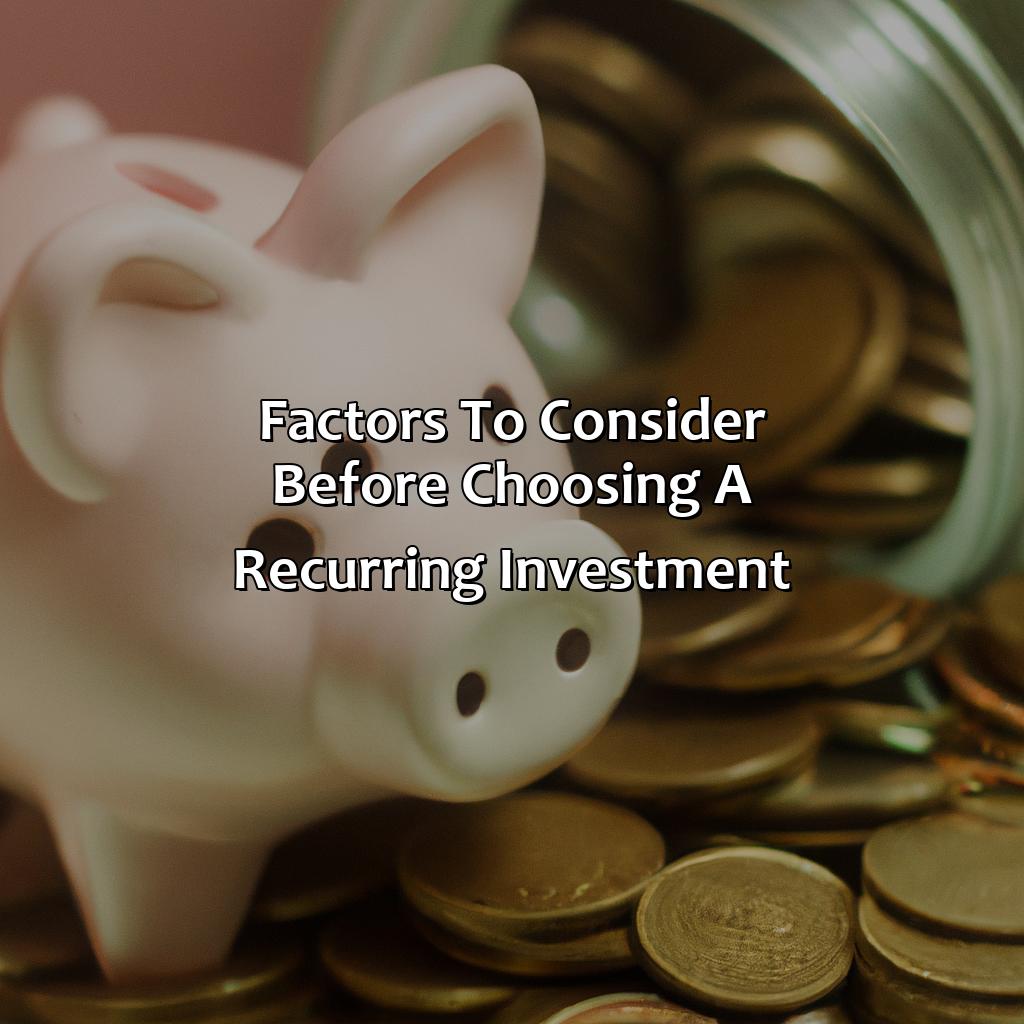
Image credits: retiregenz.com by James Arnold
Risk Appetite
Investment Risk Tolerance
It refers to an individual’s ability to bear the investment’s potential loss in the future. The higher the risk appetite, the more likely an investor is willing to take a chance on investments that offer high return rates.
To determine one’s investment risk tolerance capacity, they need to consider factors such as age, financial situations, and goals. One should invest only those amounts that they can tolerate losing because some investments carry risks of losing their principal amount.
Risk tolerance is relative and varies from person-to-person; therefore, it is crucial to understand one’s risk appetite before investing.
Furthermore, one can balance investment portfolios based on their investment risk tolerance nature. A balanced portfolio with investment spread across different asset classes, such as stocks and bonds, can help reduce potential losses and enhance returns over a more extended period. Another way to mitigate risks is by keeping aside an emergency fund for unexpected events like job loss or medical emergencies. This emergency fund will prevent individuals from redeeming their investments abruptly when faced with temporary financial crises.
Investors should not exclusively rely on past performance while investing in recurring deposits without evaluating the risks involved. Hence it is recommended that investors consult with professional financial advisors who are better equipped in assessing risks related to various investment options and alignment of personal goals in building sound investment portfolios.
“Why plan for retirement when you can just invest in a crystal ball?”
Investment Horizons
Investment horizons refer to the amount of time in which an investor expects to reach their financial goal by investing their money into various assets. This duration varies from short, medium to long term, depending on the investment objectives of each individual.
When considering investment horizons, it is essential to understand that different investment options carry varying degrees of risk and return potential. Therefore, investors must determine how much risk they are willing to take based on their expected time frame and financial goals.
Investment horizons also play a vital role when choosing a recurring investment plan since individuals need to evaluate whether they can sustain regular investments for specific durations. For instance, a person with a long-term perspective can opt for monthly or yearly investments in stocks or mutual funds compared to someone who may prefer short-term deposits like fixed deposits.
It is said that understanding one’s investment horizon has been underrated by many novice investors who tend to invest randomly without gauging their expectations thoroughly. The rule of thumb suggests the longer the duration of one’s investment horizon, the more significant potential returns from the compounded interest effect.
Expecting high returns on your recurring investment is like expecting to win the lottery every week – possible, but highly unlikely.
Return Expectations
When considering a Recurring Investment, it is essential to have reasonable expectations regarding the potential returns. A Semantic NLP variation of Return Expectations would be ‘Expected Returns’. It refers to what an investor can anticipate from their investments in terms of profits and growth over time.
Expected returns vary across various investment vehicles, such as stocks, mutual funds, bonds and more. Depending on the choice of investment, expected returns can range from conservative gains to high-risk yields. While an investor desires maximum returns, it is imperative to consider the risk factors associated with investing. In addition, evaluating historical performance data and market conditions play a crucial role in establishing realistic return expectations.
It is advisable to seek professional guidance before engaging in any investment activities that involve risks and uncertainties. Making informed choices based on market trends and constructing an efficient portfolio can help achieve long-term goals while keeping realistic expectations in check.
A classic example of unmet expectations occurred during The Dotcom Bubble. Investors gave up predictable earnings based on traditional valuation metrics for seemingly lucrative dot-com stocks that eventually ended up devalued or worthless. Reiterating why being informed about potential blind spots is imperative when setting Expected Returns.
Five Facts About Recurring Investment:
- ✅ Recurring investment involves making regular investments of a fixed amount into a financial product or account. (Source: NerdWallet)
- ✅ It is a common strategy for long-term savings and wealth building. (Source: Investopedia)
- ✅ Recurring investment can help average out the ups and downs of market fluctuations. (Source: The Balance)
- ✅ Popular financial products for recurring investment include mutual funds, index funds, and retirement accounts such as 401(k)s and IRAs. (Source: US News)
- ✅ Automating recurring investments can help increase consistency and discipline in saving and investing. (Source: Forbes)
FAQs about What Is Recurring Investment?
What is recurring investment?
Recurring investment refers to an investment strategy where an individual invests a fixed amount of money at regular intervals, such as weekly, monthly, or quarterly, in the same investment vehicle. It is also known as a systematic investment plan (SIP).
How does recurring investment work?
When you opt for a recurring investment plan, a fixed sum of money is invested at regular intervals in a mutual fund or any other investment instrument of your choice. Generally, the investment amount is automatically debited from your bank account. The benefit of this plan is that it allows investors to invest small amounts regularly, which can lead to significant gains over time.
What are the benefits of recurring investment?
Recurring investment plans offer several benefits, such as flexibility, diversification, and convenience. By investing small but consistent amounts in the long term, investors can create a sizeable corpus. These plans also promote financial discipline and help individuals achieve their financial goals.
What is the difference between recurring investment and lump sum investment?
The primary difference between recurring investment and lump sum investment is the mode of investment. In lumpsum investment, the entire amount is invested in one go, whereas, in recurring investment, the investment is made over a period of time. While lump sum investments are suitable for investors who have significant funds at their disposal, recurring investments are ideal for those who want to start investing with a small amount of money.
Is recurring investment a good option for long-term goals?
Yes, recurring investment is an ideal option for long-term goals. By investing small and regular amounts in the long term, you can build a sizeable corpus. It is also a great way to beat inflation and increase wealth. Over the long term, forces such as compounding can boost the returns on recurring investments significantly.
What should I consider before opting for a recurring investment plan?
Before opting for a recurring investment plan, you should consider your financial goals, risk tolerance, investment horizon, and your financial situation. You should also take into account the fees and expenses associated with the plan, the investment instrument, and its performance history. You should also review the investment plan regularly and make necessary changes based on your changing financial needs and market conditions.
